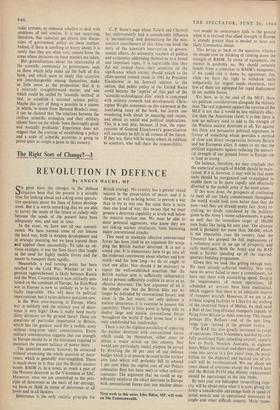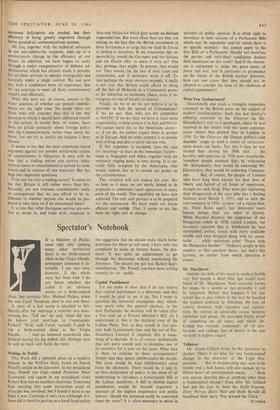The Right Sort of Change?-3
REVOLUTION IN DEFENCE
By ANGUS MAUDE, MP
S0 great have the changes in the defence situation been that the present is a suitable time for looking ahead and asking some specula- tive questions about the lines of future develop. ment. But it is worth remarking that we are able to survey the needs of the future so calmly only because the needs of the present have been adequately met, and met in time.
In the event, we have met all our commit- ments. We have learned some of our lessons the hard way, both in weapon development and in.strategic planning, but we have learned them and applied them successfully. To take an ob- vious example, it was the Suez fiasco that taught us the need for highly mobile forces and the means to transport them rapidly..
Meanwhile, a real turning point has been reached in the Cold War. Whether or not a genuine rapprochement is likely between Russia and the West, Communism is now militarily con- tained on the continent of Europe. An East-West war in Europe is now so unlikely as to be vir- tually impossible. This will have its political repercussions, but it raises defence questions now.
Is the West over-insuring in Europe, where war is unlikely and the military cost of deter- rence is very high? Does it really need nearly thirty divisions on the ground there? These are questions of particular importance to Britain, which has the greatest need for a mobile army without long-term static commitments. Every military consideration suggests that our strength in Europe should be at the minimum required to maintain the present balance of power there.
The questions cannot, however, be answered without examining the whole question of deter- rence, which is generally over-simplified. There is much more to it than just the British nuclear bomb. BAOR is, in a sense, as much a part of the Western deterrent as the V-bombers or SAC. Moreover, once we are committed to the prin- ciple of deterrence as the basis of our strategy, we have to think in terms of deterrence at all levels and in all theatres.
Deterrence is the only realistic principle for
British strategy. No country has a greater vested interest in the preservation of peace; and it is cheaper, as well as being better, to prevent a war than to try to win one. But since there is more than one kind of war, this means that we must possess a deterrent capability at levels well below the massive nuclear one. We must be able to deter potential aggressors, who know they are not risking nuclear retaliation, from launching major conventional attacks.
This need to maintain effective conventional forces has been cited as an argument for scrap- ping the British nuclear deterrent. It is not a sound one. It is unnecessary here to go into all the irrelevant controversy about whether and how much—and for how long—we do or ought to trust our allies. Nor should it be necessary to repeat the well-established assertion that the British nuclear arm is sufficiently independent and at present sufficiently credible to serve as an effective deterrent. The best argument of all is the simple one that the British Isles can no longer be defended by conventional forces; and since, in the last resort, our only defence is nuclear deterrence, it is essential to possess this capability. There is little point in being able to deploy large and mobile conventional forces throughout the world if their home base is not only undefended. but indefensible.
There is not the slightest possibility of replacing the nuclear deterrent with conventional forces which could, by themselves, either deter or defeat a major attack. on this country. Nor would any particularly useful purpose be served by diverting the 10 per cent of our defence budget which is at present devoted to the nuclear arm (and which will probably fall to around 5 per cent when the capital cost of our Polaris submarine fleet has been met) to other military resources. The argument that we could so sig- nificantly reinforce the allied deterrent in Europe with conventional forces that our nuclear deter-
Next week in this series John Biffen, MP, will write on The Commonwealth. rent would be unnecessary falls to the ground when it is realised that allied strength in Europe is already greater than is needed to deter any likely Communist threat.
This brings us back to the question, whether we should now be thinking of running down the strength of BAOR. In terms of equipment, the answer is probably no. We should certainly benefit from a reduction in BAOR's manpower, if we could run it down by agreement; for, while we have the right to withdraw units temporarily for urgent needs elsewhere, very few of them are equipped for rapid deployment in our mobile forces.
Yet here, as in the case of the MLF, there are political considerations alongside the military ones.The real argument against the creation of the MLF is not that it would be less militarily effec- tive than the Americans claim; it is that there is now no military need to add to the strength of the Western nuclear deterrent at all. Yet against this there are persuasive political arguments in favour of something which provides a method of close and direct co-operation between Britain and her European allies. It seems to me that the political arguments against reducing the numeri- cal strength of our ground forces in Europe are at least as strong.
On balance, therefore, we may conclude that the numerical strength of BAOR should be main- tained. If it is, however, it may well be that some units should be reorganised and re-equipped to enable them to be more rapidly and effectively diverted to the mobile army if the need arose.
If this were done, the prospects of continuing to meet all our likely commitments throughout the world would look even better than they do now—and they are already pretty fair. Army re- cruiting, no doubt stimulated by the publicity given to The Army's recent achievements, is going so well that the immediate target of 180,000 men looks like being hit next year. The ultimate need is probably for more than 200,000, which is not impossible once the country (and the Treasury) has grasped the full implications of a voluntary army in an age of prosperity and early marriages. Both the Army and the RAF need a further speeding up of the married- quarters building programme.
Given this, we look like getting enough men. We have already achieved mobility. Not only have we never failed to meet a commitment, we have met them with astonishing speed. Despite the requirements of .recent operations, all scheduled air services have been maintained, which suggests that there is an adequate reserve of transport aircraft. However, if we are to do without staging facilities in Libya (to say nothing of the uncertain future of Malta), we shall need a fleet of fast long-distance transports capable of flying from Britain to Aden non-stop. This means perhaps fifty Belfasts—and of the new long- range type—instead of the present twelve.
The RAF has also greatly increased its range of operations. Three V-bombers,.assisted by care- fully positioned flight refuelling aircraft, recently flew to Perth, Western Australia, in eighteen hours. When the vertical- and short-take-off planes come into service in a few years' time, the possi- bilities for the dispersal and tactical use of air- craft will be revolutionised. We are about ten years ahead of everyone except the French here and the British P1154 (the Hunter replacement) should be operational in the late 1960s.
By next year our helicopter troop-lifting capa- city will be about twice what it is now, giving the Army a considerable advantage both in speed of initial assault and in operational movement in jungle and other difficult country. More recon- naissance helicopters are needed, but their efficiency is being greatly improved through better ground-air communications systems. • All this, together with the technical advances in our anti-submarine weapons, adds up to a revolutionary change in the efficiency of our forces. In addition, we have begun to carry through a major reorganisation of defence ad- ministration which has already made it possible for all three services to operate strategically and tactically under a single control. We can now say, with a confidence born of experience, that We can continue to meet all likely commitments rapidly and efficiently.
What this does not, of course, answer is the wider question of whether our present commit- ments are the right ones. No doubt there are' those who will consider that this is the real question to which I should have addressed myself in this article. It would then, of course, have been an article primarily about foreign policy and the Commonwealth, rather than about de- fence. Let me try to justify the balance I have chosen.
It seems to me that the most commonly heard argument against our present world-wide system of commitments is fallacious. It may well be true that a trading nation can survive today without bases or commitments to defend its trade routes and its sources of raw materials. But this begs two important questions.
First, are we only a trading nation? It seems to me that Britain is still rather more than this. Secondly, are our overseas commitments really so unimportant that we can afford to be in- different to whether anyone else would be pre- pared to take them on if we abandoned them?
It is true that other European nations are con- tent to invest in, and trade with, countries in Asia and Africa for which they accept no defence responsibilities. But more often than not they are relying on the fact that the British investment in these territories is so large that we shall be forced to defend it ourselves, if we renounced this re- sponsibility, would the Germans and the Italians and the Dutch offer to share it with us? One day, perhaps, they might. At present, they would not. They would risk the loss of their trade and investments, and if necessary write it off. To take perhaps the most obvious example, it really is not true that Britain could afford to shrug off the loss of Malaysia to a Communist power or its reduction to economic chaos, even if we recognise no ties of loyalty or honour.
Finally, do we or do we not believe it to be desirable to halt the spread of Communism? If we do not, then why are we committed to NATO? If we do, then we have at least some responsibility to help contain it in Asia and Africa. We cannot leave this to the Americans alone-- or, if we do, we cannot expect them to protect us in Europe. And no other country is at present both willing and able to carry out our role.
If this argument is accepted, then the case for retaining—at least in the immediate future— bases at Singapore and Aden, together 'with the necessary staging posts, is very strong. It is cer- tainly fully accepted by the Americans, who would, indeed, like us to extend our power on the circumference.
This situation will not endure for ever. But so long as it does, we are surely bound to be prepared to undertake rapid operations in many parts of the world. This capability we have now achieved. The only safe posture is to be prepared for the unexpected. We have made our forces efficient and mobile. That, it seems to me, has been the right sort of change.



































 Previous page
Previous page